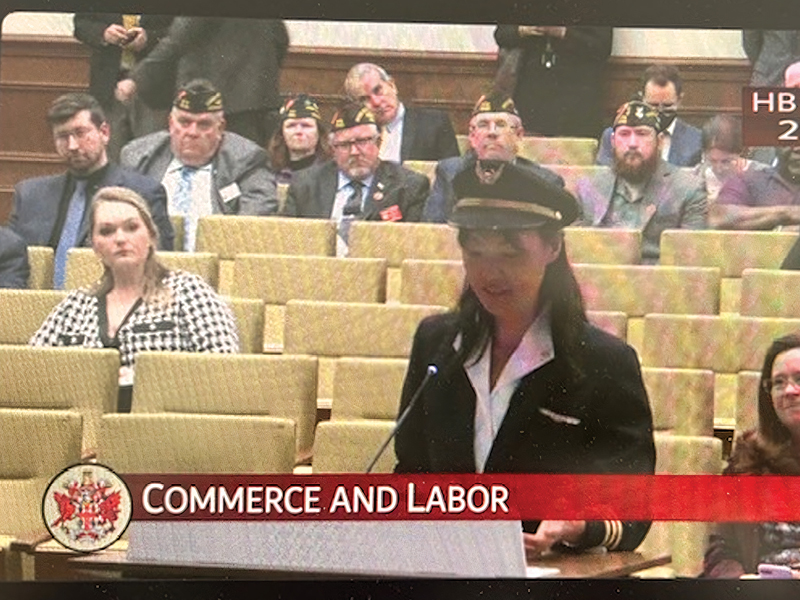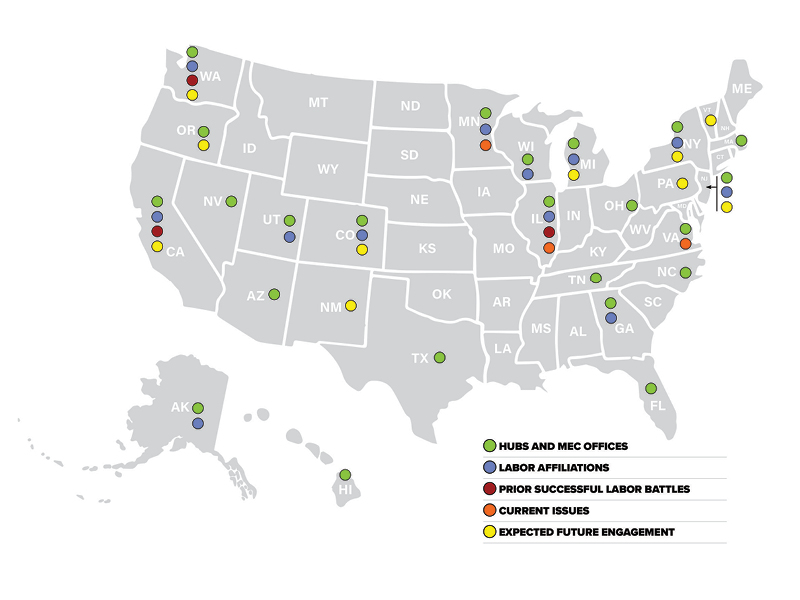The Assault on Pilots’ State Rights
By ALPA Government Affairs Department Staff

F/O Kaori Paris (United) testifies before the Virginia Senate regarding the exclusion of flightcrew members from the state bereavement-leave benefit.
Airlines and their trade association have stepped up lobbying efforts at the state level to prevent airline workers, specifically pilots and flight attendants, from taking advantage of state labor laws like family or sick leave. These efforts follow their failed attempts to change the Airline Deregulation Act (ADA) of 1978 at the federal level and in the courts to their advantage. Airlines claim the ADA should preempt any state or local laws or ordinances that provide worker benefits, including sick leave or meal and rest breaks, because airlines are largely federally regulated. The ADA regulates airlines on routes, service and price, and customer-facing business decisions. It specifically doesn’t preempt state and local employment-related laws like family leave. Yet this hasn’t stopped airlines from using state legislatures to deny pilots their right to advantageous labor laws that other workers enjoy.
ALPA Elevates Engagement in District Advocacy and with State Labor Organizations
At the direction of ALPA’s leaders, the Association is prioritizing expanding its reach into individual states by increasing the union’s District Advocate program and integrating ALPA’s state labor representatives with the Association’s government affairs programs. ALPA’s district advocates are trained via ALPA’s online academy or Government Affairs Department staff to advocate on ALPA priorities directly with elected officials in their home states and districts. District advocates are able to keep abreast of state or local legislative proposals that could impact ALPA members’ livelihoods in their states. This is necessary because legislation is being introduced at all levels across the nation that could negatively or positively impact airline pilots and their contracts and rights, and ALPA’s engagement can be critical to whether the legislation becomes law.
Earlier this year, ALPA’s Executive Council approved resolutions to affiliate with additional state labor organizations, providing added resources and needed individuals for the Association’s state lobbying efforts. In New York, Michigan, Minnesota, and Washington, ALPA has designated representatives who are conduits with state labor federations and the vast network of resources and affiliated union partners. The state labor federations are experts in state legislative matters, lobbying, and organizing advocacy campaigns.
This year, ALPA Government Affairs staff worked with pilot advocates, state labor representatives, the Minnesota Federation of Labor, and labor union partners to restore state sick-leave benefits to pilots and flight attendants.
Fight to Restore Rights Successful in Minnesota
In late 2023, the Minnesota legislature passed and Gov. Tim Walz (D) signed the Minnesota Earned Sick and Safe Time (ESST) bill, which excluded flightcrew members from the legislation. A late lobbying blitz by airlines resulted in a last-minute change to the bill to carve out pilots and flight attendants from the benefit that all other Minnesota workers would have access to when implemented in 2024. After learning of the exclusion, ALPA engaged with the AFL-CIO in Washington, D.C., to help put together a coordinated plan to fix the problem. The AFL-CIO brought in the Minnesota AFL-CIO (state labor federation), which advised the Association on the state legislature key players, potential allies, and details about the new legislative session beginning in 2024. ALPA explained the issue and how to resolve it legislatively so that flight crews could be included in the ESST benefit, then the labor coalition went to work.
Sens. Sandy Pappas (D-65) and Jen McEwen (D-8) and Rep. Kaela Berg (D-55B) were the union’s champions. It was helpful that Berg is also a flight attendant and AFA-CWA member. She was instrumental in facilitating ALPA testimony during the legislative process. Capt. David Forbes (Delta), his pilot group’s Local Executive Council chair in Minneapolis, testified in the Minnesota House of Representatives. He, along with a dozen pilots and flight attendants, provided state House committee members with compelling information to support the Association’s legislative fix to be incorporated into a larger “must pass” bill moving through the legislature. Later in the year, approximately 20 pilots, other flightcrew members, and Government Affairs staff gathered in St. Paul to support F/O Laura Haynor (Delta) as she testified before the Minnesota Senate Labor Committee.
During subsequent hearings and markups of the legislation, the airlines’ trade association, Airlines for America (A4A), requested to testify. Staff from ALPA’s Government Affairs and Legal Departments worked together to ensure that all state legislators’ and administration officials’ questions stemming from A4A testimony and engagement were answered. On the last day of their legislative session, just hours before it was mandated by law to end the session, elected officials asked to meet with ALPA another time to solidify support against industry lobbying.
Fortunately, the Association’s relationship with the Minnesota State Federation of Labor and labor alliance paid dividends as ALPA convinced state officials that they didn’t need to maintain the flight crew exclusion. Today, Minnesota-based pilots can avail themselves of the benefits of the ESST program. The Association fully expects airlines to introduce language to exclude flight crews from the ESST during the next legislative session, and ALPA will be prepared.
The Fight for Bereavement-Leave Benefits in Virginia
While Government Affairs staff members were fully engaged in the sick-leave battle in Minnesota and preventing any federal preemption in the FAA reauthorization bill in the U.S. Congress, the Virginia House of Delegates passed a bereavement-leave bill that excluded flight crews from the benefit. The legislation provided for 10 days of mandatory unpaid bereavement leave.
Fortunately, ALPA already had a long-standing relationship with the Northern Virginia Airport Labor Caucus and Central Labor Council, which helped facilitate quick engagement with state legislators. Delegate Sam Rasoul (D-38), the author of the legislation, was receptive to helping correct the flight crew carveout when the Association put forth its case. Rasoul presented the legislation to the Virginia Senate three days later with changes ALPA sought to strike regarding the exclusion of flightcrew members from the bereavement benefit. Moreover, staff from Government Affairs quickly worked with the United Master Executive Council’s Government Affairs Committee to provide an ALPA witness to also testify in the Virginia Senate. F/O Kaori Paris (United) provided firsthand subject-matter expertise on the carveout along with other union supporters of the Association’s position.
The Senate passed the amended bereavement bill. However, Virginia Gov. Glenn Youngkin (R) vetoed the legislation, and, therefore, Virginia workers won’t have the bereavement leave available to them.
These are just two examples of ALPA state advocacy this year. The Association is also engaging in California and Illinois and monitoring state issues in Colorado, Michigan, New Jersey, Oregon, and Vermont, among other states. The upcoming 2025 state legislative sessions will be busy and present opportunities for ALPA to advance worker benefits for flight crews and will necessitate aggressive defense to stop onerous proposals from denying state rights to pilots and other flightcrew members.
Map Highlighting ALPA's State Legislative Activity


